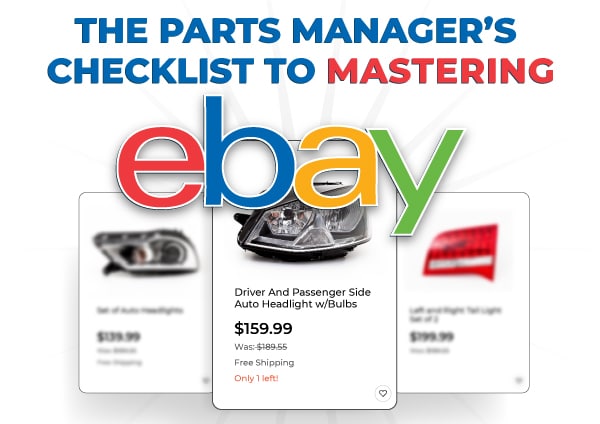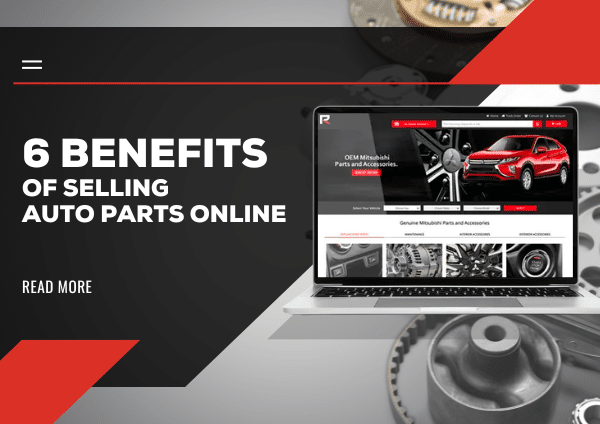If your parts department still relies on a long, complex parts form, you’re in trouble. With more than half of consumers choosing not to buy new or even used vehicles, the parts department can be a great source of additional revenue. With such a massive surge in the number of parts buyers on the market today, your parts department must provide a seamless online buying experience.
Online Parts Shopping Is The New Normal
The online retail market is the new standard for today’s consumers. Online shopping provides convenience and speed for your typical customer and is oftentimes, a more cost-effective buying option.
With the distinct advantages that the online retail market offers, consumers are more inclined to make all their purchases online and forgo visiting brick-and-mortar establishments. The auto industry is no exception to this change in buyer behavior.
The digital influence on auto parts and accessories market is estimated to generate close to $177 billion in total revenue by the end of 2023. How can your dealership capitalize on this growth?
The Traditional Parts Form Isn’t Working Anymore
The traditional parts form has various problems, each contributing to a poor customer buying experience. It’s slow, inefficient, and highly error-prone. When the buying experience isn’t seamless, your dealership essentially drives business away.
The Limitations of a Parts Form
The parts form limits your parts department’s ability to run efficiently in three ways.
Time Lost
Once a parts form is completed, it takes hours and sometimes even days to confirm with customers about the status of their parts order or give a quote. Hours spent making phone calls to customers and tracking down the right contact information make getting a part ordered, purchased, and delivered an incredibly time-consuming process.
Error-Prone Manual Entries
Customers and department staff alike can easily make errors when dealing with a parts form. Complex forms with lots of steps, unclear information, and mismarked fields can lead to hundreds of customers getting the wrong part for their vehicle. This means more steps are required to get the right part ordered, sell or send back the wrong parts, and leads to high inventory pile-ups.
Difficulty Tying to Inventory Tracking
How do you know the state of your inventory if you don’t know where certain parts came from? Parts returns are one of the biggest contributors to obsolescence in the parts department. High obsolescence makes it more difficult for your parts department to determine what inventory you have, what you need, and what inventory you can turn into a quick sale.
Risks of the Parts Form
There are significant risks that result from the inefficiencies of a parts form as well.
Lost Sales Opportunities
The most obvious financial risk to the parts department due to a parts form is lost sales opportunities. When customers have a complicated buying experience with your parts department, they’re more likely to go straight to your competitors. This drives down revenue for the dealership.
High Operational Costs
Order errors are one of the biggest issues with the parts form. Ordering the wrong parts leads to wasted time and money for the parts staff. High overhead costs for parts that end up not being sold cut into the dealership’s total profitability.
Damage to Brand Reputation
A poor buying experience is the same as bad advertising. Customers talk to each other, and if your parts form prevents them from getting the parts they need fast, they’ll tell others about it. Before you know it, a large percentage of your buyer market will have turned against you. An inefficient buying experience damages your dealership’s brand reputation more than you may realize.
The Top 3 Benefits of an Online Auto Parts Store
To keep up with the modern buying experience, you need to provide your customers with a seamless, easy way to purchase. The best way to do this is through an online parts store. A website dedicated to just auto parts available at your dealership is a surefire way to capture and keep new business.
A designated parts store gives you three significant advantages.
Improved Efficiency and Accuracy
With an online store, the parts department gets built-in automated processes that help decrease manual work and free up time for other important tasks. Automated integrations can help effectively run customer service management, inventory tracking, sales trends, and more. Get accurate reporting information to reduce order errors and eliminate inventory pile-ups.
Enhanced Customer Experience
Making shopping online simple is the best way to draw in customers. With a dedicated online store, the parts department can make shopping for auto parts online convenient. Having parts listed online that are easy to navigate, search, get product information, and make purchases is an essential tool in enhancing the customer experience. With 24/7 accessibility to available parts online, your dealership can literally generate revenue while you sleep.
Increased Sales and Profitability
Improved efficiency and happy customers lead to one result, profitability. The capabilities that eCommerce provides your dealership are unmatched by traditional business models. Through a streamlined eCommerce approach, you can reach a wider customer base, implement new effective strategies, and help grow your business more strategically.
Switch to a Strong eCommerce Approach
The parts form, like many traditional business approaches at the dealership, is holding your business back. To effectively grow your parts business and maintain steady revenue, your parts department needs to invest in robust eCommerce tactics and tools and throw the old parts form out.
Ready to dive into the world of automotive eCommerce but not sure where to start? Get our free guide, Selling Parts Online 101, for a crash course on eCommerce today.




